Thomas Nagel on Transcendence and Ineffability
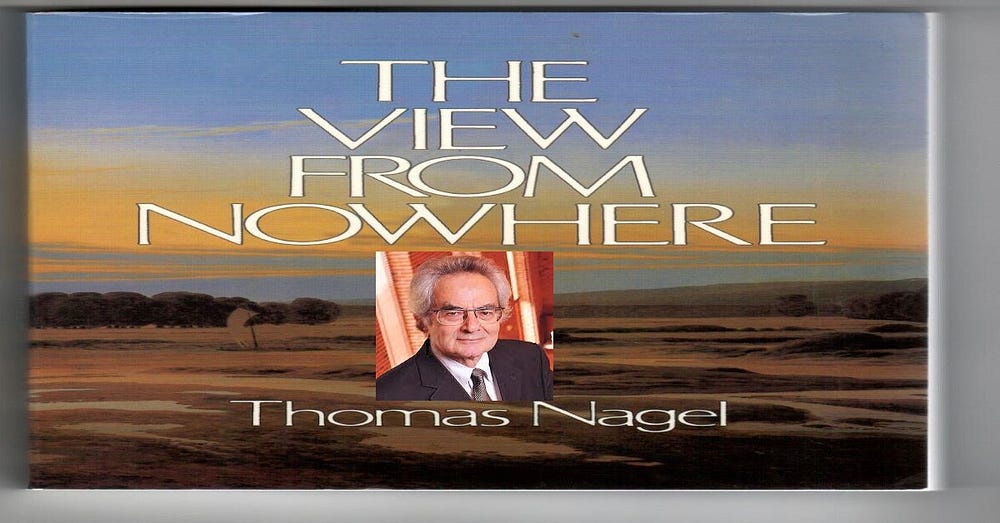
“There are, indeed, things that cannot be put into words. They make themselves manifest. They are what is mystical.”
- Ludwig Wittgenstein (from his Tractatus Logico-Philosophicus)
[This essay was written quite some time ago. The style is somewhat rhetorical, literary and (as it were) psychologistic. That said, I still agree with much of its philosophical content. However, if I were to write it today, the style would be a little different. Indeed most analytic philosophers would probably regard this essay as one long ad hominem against the American philosopher Thomas Nagel (1937-). Sure; there is an element of the ad hominem in the following. Yet hopefully it will be shown that there’s more to the essay than that.
(In fact I chose to write in a rhetorical style partly in response to the clear and prevalent rhetoric and “psychologising” I found in Thomas Nagel’s own book, The Last Word.]
In addition, the prefix “new” in “new mysterian” is a little dated (i.e., new mysterianism is no longer new) because the term was first coined in 1991 by the American philosopher Owen Flanagan (1949-). (See Flanagan’s The Science of the Mind.) What also needs to be said is that I’m using Flanagan’s word “mysterian” more widely and more literally than he does. That is, in Nagel’s case I’m stressing Nagel’s mysterianism and mysticism across the board. Flanagan, on the other hand, only (really?) had mysterian positions on consciousness in mind. That said, the term “new mysterianism” has also been applied to the wider position that there’s far more than one “hard problem” (i.e., the “hard problem of consciousness”). It also includes the belief that science is intrinsically and fundamentally limited in many respects. This is a self-conscious kind of anti-scientism.]
Introduction

“There are desires and sentiments prior to reason that it is not appropriate for reason to evaluate.”
-Thomas Nagel, The Last Word (1997)
My reason for taking the following approach to Thomas Nagel’s philosophical positions comes from certain comments he made in his books The View from Nowhere (1988) and The Last Word. In those books he states that his philosophy is driven by his moral feelings. Now some people may say that there’s nothing strange with that in the field of ethics itself. However, what if Nagel’s “desires and sentiments” are responsible for his metaphysical and epistemological positions too?
Take Nagel’s (following) pronouncements and compare them with Michael Ayers comments on John Locke. In that book Ayers writes that it’s “absurd” to think of
“a particular moral, political or religious orientation’s motivating a theory of knowledge or being”.
So this essay isn’t really an analysis of Nagel’s positions within metaphysics and epistemology. It’s an examination of why Nagel may hold such positions in the first place. It’s not to the point, therefore, to say that I don’t offer any good critical analyses of Nagel’s positions on necessity, objectivity or “pre-linguistic concepts”. Such analyses are not the purpose of this essay. Instead, I want to explain why Nagel holds such positions; not whether his positions have any argumentative power.
This means the work is also somewhat speculative and psychological. And that’s primarily the case because — to state the obvious — I haven’t actually got access to Nagel’s (non-verbalised) mind.
Nagel’s Metaphilosophy and His Moral Hopes
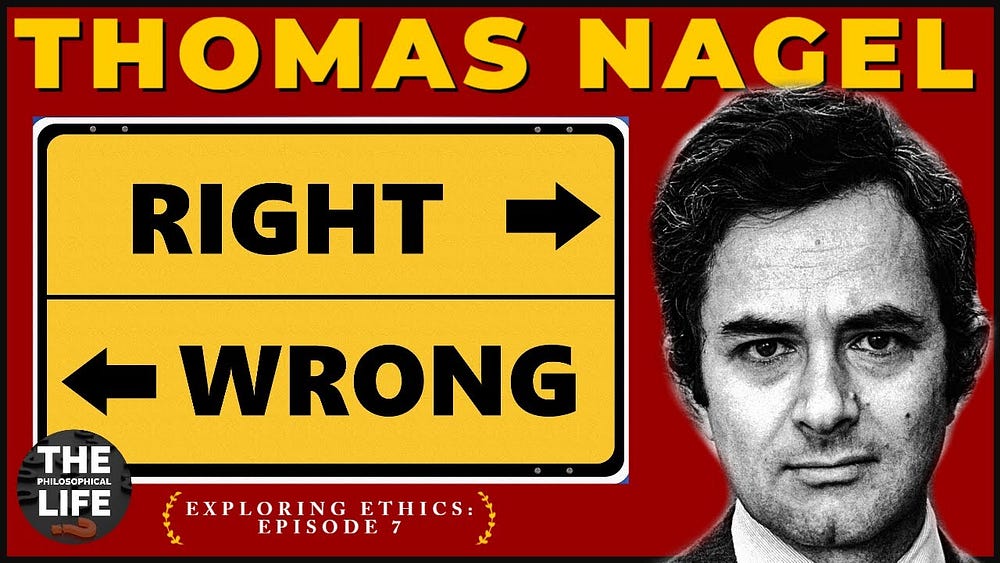
In Nagel’s case there seems to be a kind of pragmatism in the air. In fact precisely the same kind of pragmatism that Nagel argues against when displayed by philosophers like Richard Rorty (see Nagel on Rorty here) and Hilary Putnam (1926- 2016) (see Putnam on Nagel here). What is meant by this is that one could take Nagel’s opening quote to be an acknowledgment that one’s metaphysics and epistemology should simply be the handmaidens of one’s metaphilosophical and moral hopes.
Indeed this was what Kant more or less argued (in his Critique of Pure Reason) about “moral philosophy” and its relation to metaphysics and epistemology. It’s also what Aquinas argued (in his Summa Theologica) about logic’s and philosophy’s relation to theology.
In the case of Nagel, if certain metaphilosophical and moral “desires and sentiments” are “prior to reason” and should therefore not be “evaluated”, then they should also be defended all the way down the line of philosophical speculation and analysis. And, as is clear, Nagel’s comments on logic, mathematics and various givens may simply the groundwork for his positions on metaphilosophy and morality which he deems to be much more important. This may mean that the metaphysical and epistemological positions advanced in (for example) The Last Word are simply the substructure which Nagel feels is needed to support his larger metaphilosophical and moral edifice.
As already hinted at, there’s nothing new here.
For example, Kant the transcendental idealist professor ended up believing exactly the same things about God, immortality, freedom and morality as Kant the North German Pietist who preceded him. Indeed it can easily be argued that Kant’s whole philosophical enterprise was an attempt to “limit reason in order to make room for faith”. Bishop Berkeley’s philosophical system was also an attempt to limit the pretensions of the advancing materialist and deterministic Newtonian science. And Descartes was at his most dishonest when he smuggled in God to tighten up his system and guard Christianity from 17th century sceptics.
So Nagel (via his anti-naturalism or mysterianism) is attempting to limit philosophical naturalism (which, in his view, includes pragmatism, positivism and the late Wittgenstein) in order to make room for (amongst other things) the ineffable, the necessary and for non-linguistic “thought”.
Nagel on Transcendence and Ineffability
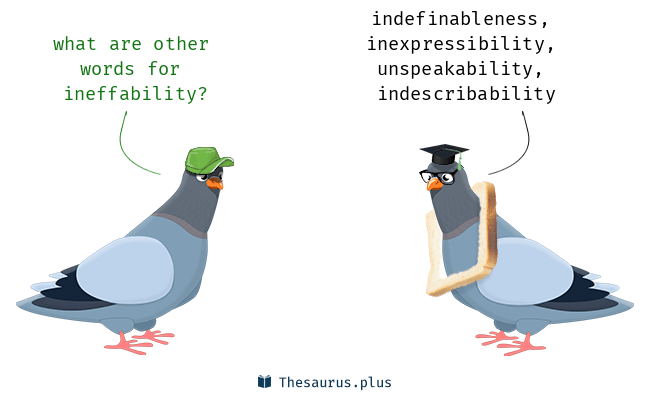
It will become clear that Nagel is [or was] offering some kind of mystical or quasi-religious line on philosophy. Take Nagel’s own words on this in his book The Last Word:
“Rationalism has always had a more religious flavour than empiricism.”
So it’s clear (to me at least) that Nagel is precisely the kind of rationalist he refers to above.
So let’s cite some examples.
Nagel wants to downgrade the analysis of language (or at least language use). The analysis of language is, after all, an empirical enquiry. Nagel, instead, emphasises the point that his own own “concepts” predate experience in a manner which roughly compares with Kant’s a priori “concepts” or Frege’s notion of what he called Thoughts.
Nagel is a rationalist in the Cartesian sense too.
To such rationalists, the human subject can unhook himself from the rest of the empirical world (including his own body) and then philosophise in order to gain truth. Indeed not even the empirical data needed for such cogitations are of much importance when compared to the (to use Nagel’s words) “order of reasons” which we must “submit to” rather than “create”.
Thus Nagel is searching for the necessary, the absolute and those aspects of the human mind which we all share. Such a search is essentially Kantian in spirit, if not in actual content.
Yet what is it, precisely, that’s mystical or quasi-religious about all the above?
Is Nagel’s Position Mystical?
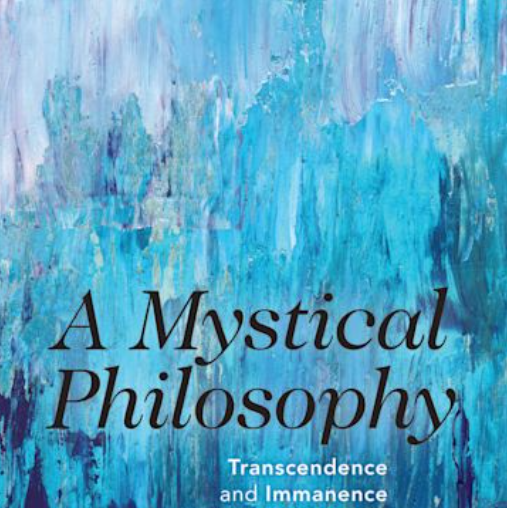
As just stated, Nagel downgrades experience, language and contingency. He’s essentially stressing those facets of reason and mind which human beings come into the world with. That is, those things which are built into us as human subjects in a manner which Kant would recognise. (Note that Nagel attacks Kant’s “idealism”.) And if these things were there before language and all other interactions with society, then they’re closer to God than they are to the world of departmental seminars, raging hormones, book deals, voting and tax forms. (A world in which Nagel, presumably, lives and breathes.) By tapping into these givens (or simply by using or understanding them through realist analytic philosophy), we’re also acknowledging God’s — rather than society’s — gifts to us.
Yet even if Nagel is not — rather immodestly — placing himself and selected other philosophers closer to God, he is in effect celebrating the things which God has placed within us. This effectively means that by distancing himself from (as Nagel puts it) “time and chance”, Nagel becomes closer and closer to the Eternal and the Necessary — which are God’s works. Contingency, on the other hand, is the Devil’s work.
This is also the Platonist strain in Nagel.
Yet there are some things about Nagel’s philosophical positions which are clearly more mystical than outrightly religious.
Take his frequently reiterated position on the “view from Nowhere”.
Firstly, when it comes to Nagel’s view of the world and its relation to scientific claims, things don’t appear particularly mystical. However, when Nagel says that he wants to “get outside” of himself in order to “reach a descriptive standpoint from which the first person has vanished”, he does indeed sound mystical.
Of course it needs to be asked if readers are meant to take Nagel literally or metaphorically when he utters these phrases. Yet it seems that there are good reasons to take him literally. In any case, how would a metaphorical reading of his words be cashed out? Perhaps not even Nagel could tell us.
So if we take Nagel literally, shades of (amongst others) Plotinus can be seen. However, whereas Plotinus wanted to achieve harmony with what he called “the One”, Nagel would like to achieve harmony with the perspective-free external world — the world we discover when we cleanse ourselves of what Nagel’s calls the “first person”.
The world (as it’s often put) as it is in itself is like God — or is God — to Nagel. (This may show the influence of Spinoza.) Similarly, whereas Plotinus rages against “plurality”, Nagel’s devil is contingency. (Wasn’t “plurality” a consequence of contingency for Plotinus?)
To finish off on this line of reasoning, here’s a poetic (i.e., for Kant) passage from the Critique of Pure Reason (1781/1787):
“[] Plato, abandoning the world of sense because of the narrow limits it sets to the understanding, venture[s] upon the wings of ideas beyond it, into the void space of pure intellect.”
It need hardly be said that Nagel is similarly advocating “abandoning the world” of empirical (or experiential) reality and language because he deems such things to be inadequate to the task of providing us with necessity, certainty, objectivity and other such holies. So perhaps Nagel too ends up in the “void space of pure intellect”.
Now there’s large problem for my position as advanced in all the above: Nagel has often called himself an “atheist” (see here)!
Is Nagel an Atheist?
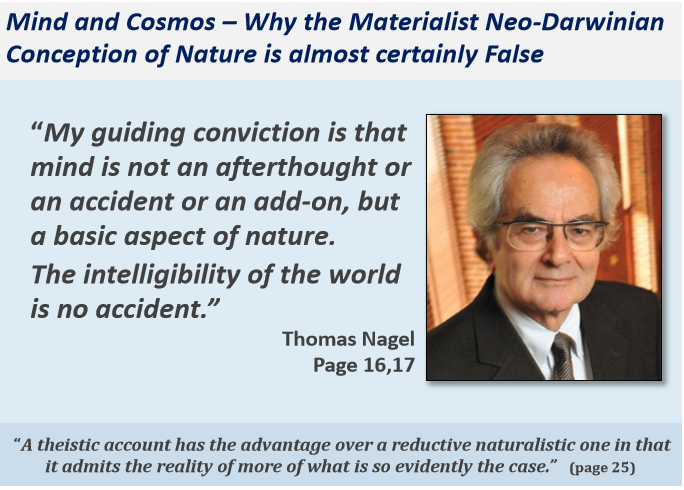
Even if Nagel’s honesty can’t be doubted (as Nagel himself doubts the honesty of Alasdair MacIntyre and what he calls the “ritualist relativists and subjectivists”), his atheism isn’t really a big problem to the central thesis. That’s because the religious impulse (or instinct) can survive quite easily without the God of monotheistic religions. Indeed all sorts of psychologists and sociologists have written thousands of words on this very phenomenon. These people have shown us (if we needed to be shown) how hard it is to throw off the baggage placed upon us by our history, society and our parents.
Thus Nagel has finessed mystical/religious positions and made them seem more modern and sophisticated. That is, he’s expressed mystical/religious positions in the language game of late 20th century analytic philosophy. Thus it’s mainly a case of old wine in new bottles.
The early Wittgenstein (i.e., unlike the late Wittgenstein) also provides Nagel with ammunition to fight for the ineffability and transcendence cause. Nagel sums up Tractarian Wittgenstein as claiming that
“what couldn’t [] be said was much more important than what could be”.
For Wittgenstein at this point, these (as it were) ineffables were (among other things) “logical objects”, logical relations and the relations between empirical propositions and the possibilities they represented. However, to Wittgenstein these things were simply (at least on my reading) the logical entities which grounded much more important ineffables — such as the human subject. This subject is outside the world and also the foundation of moral and aesthetic value judgements — judgements which the subject simply intuits or feels (i.e., subjects not unlike Kant’s noumenal self).
Again like the early — and late — Wittgenstein, Nagel doesn’t like too much talk. Too much talk ruins or destroys what it is that’s talked about. So let’s try not to talk about, say, neurons and synapses when we talk about the self or mind. Let the self or mind, unlike every other thing in this gigantic universe, spring free of all causal mechanisms. Nagel believes that we intuitively know this to be true. And talk could undo that truth. Indeed only positivists and “scientistic philosophers” want to talk about everything. Such people, Nagel seems to believe, don’t recognise the soul (or the soul’s calling) quite simply because they don’t recognise that they have souls.
This interest in the ineffable often goes alongside a belief in philosophical depth.
Nagel believes that that real (or important) philosophical problems are intrinsically deep. He even tells us that an old teacher of his (i.e., J.L. Austin) distrusted depth; though “depth was what I thirsted for”. This seems to mean that it was depth in itself (or depth for itself) that interested Nagel at that time — and still does; not the fact that depth is often simply an accidental byproduct of certain (i.e., not all) philosophical problems.
So what is “philosophical depth”?
Those words can’t be a synonym for “philosophical complexity”. Is it more, well, spatial than that? Is it the Reality under the Appearances? The Noumenal Self under the empirical self? The Logical Form under the grammatical form? The Essence under the accidents? The Truth under the (to use Nagel’s word) “simulacra”?
Depth is something priests like to give us. It’s something they believe to be beyond trivialities and superficialities. And when we reach the depths such priests have hinted at, then we will find “the meaning of life” and “what it’s all about”. In the case of Nagel, we also find essence, necessity and objective truth: all seen from the non-perspectival and incredible View From Nowhere.
The early Wittgenstein (again) similarly “thirsted for depth”. That said, he came to believe that philosophers had (in a sense) been mislead by this spatial metaphor (amongst other things). Or, as the American philosopher Terence Parsons once put it (if about a slightly different subject):
“[As] half the rest of the [analytic] philosophical world have been telling us, you can’t trust the ‘surface’.”
*****************************************************************









No comments:
Post a Comment